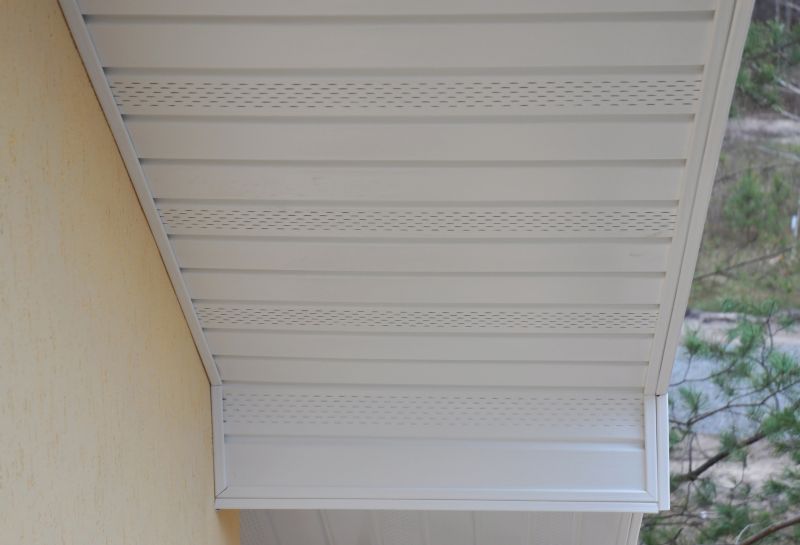Leading Soffit And Fascia Products For Easy Home Exterior Upgrades
Find the perfect soffit and fascia materials to upgrade your home's exterior with ease and confidence.
 Soffit and fascia products are essential components in roofing and exterior wall installations, providing both aesthetic appeal and functional protection. These elements help to vent attic spaces, prevent water infiltration, and shield the underlying structure from weather-related damage. Choosing the right soffit and fascia materials involves understanding various options, including different materials, styles, and installation methods. Proper selection can enhance the durability and appearance of a building while ensuring ease of maintenance.
Soffit and fascia products are essential components in roofing and exterior wall installations, providing both aesthetic appeal and functional protection. These elements help to vent attic spaces, prevent water infiltration, and shield the underlying structure from weather-related damage. Choosing the right soffit and fascia materials involves understanding various options, including different materials, styles, and installation methods. Proper selection can enhance the durability and appearance of a building while ensuring ease of maintenance.
Top Overall Option
Aluminum Soffit and Fascia System
An aluminum soffit and fascia system offers a durable, low-maintenance solution suitable for various climate conditions. Its resistance to rust, rot, and pests makes it a reliable choice for long-term performance. Aluminum components are lightweight and easy to install, often featuring pre-formed panels that simplify the installation process. They can be painted or finished in different colors to match the aesthetic of the building, providing versatility and visual appeal. This type of system is well-regarded for its ability to withstand harsh weather while maintaining its appearance over time.
Types of Products For Soffit And Fascia Installations
Vented Aluminum Soffit Panels
Designed to provide ventilation while protecting the underside of the roof overhang, vented aluminum soffit panels are lightweight and resistant to corrosion, making them suitable for various climates.
Non-Vented Vinyl Soffit Panels
Offering a maintenance-free option, non-vented vinyl soffit panels are easy to install and available in numerous colors and styles to complement different exterior designs.
Wood Fascia Boards
Traditional wood fascia boards provide a classic look and can be painted or stained to match other exterior elements, though they may require regular maintenance.
Aluminum Fascia Boards
Aluminum fascia offers durability and resistance to pests and rot, with the added benefit of being lightweight and easy to install.
PVC Fascia Boards
PVC fascia is a low-maintenance alternative that resists moisture and decay, suitable for areas with high humidity or frequent rain.
Steel Soffit and Fascia Systems
Heavy-duty steel options are available for industrial or high-wind areas, providing strength and long-lasting performance.
Composite Soffit Panels
Composite materials combine durability with aesthetic versatility, often mimicking wood or other natural textures.
Pre-formed Corner Pieces
Designed to simplify installation, corner pieces help achieve a clean, professional look at junction points.
Ventilated Fascia Covers
These covers incorporate ventilation features to facilitate airflow and help regulate attic temperatures.
Decorative Fascia Trim
Available in various profiles and finishes, decorative fascia trim adds visual interest and enhances curb appeal.
Popular Choices
Vinyl soffit panels are favored for their affordability, ease of installation, and low maintenance requirements.
Vented aluminum soffit panels are popular for their durability and effective ventilation capabilities.
Many homeowners choose wood fascia for its traditional appearance and ease of customization with paint or stain.
PVC fascia offers a moisture-resistant, low-maintenance option that is suitable for various climates.
Pre-finished aluminum fascia provides a quick, durable solution with minimal upkeep.
Steel options are selected for their strength and suitability in high-wind or industrial settings.
Composite soffit panels are gaining popularity for their durability and aesthetic versatility.
Complete sets that match in color and style are often chosen for a cohesive exterior appearance.
Fascia covers with ventilation features are increasingly used to improve attic airflow.
Decorative trims are popular for adding architectural detail and enhancing overall curb appeal.
Soffit panels are typically installed beneath the eaves and can be vented or non-vented, depending on ventilation needs. They come in a range of materials such as aluminum, vinyl, and wood, each offering unique benefits in terms of longevity, maintenance, and visual appeal. Fascia boards are mounted along the roofline, providing a finishing touch that covers the ends of the rafters and supports the gutter system. Like soffit panels, fascia boards are available in multiple materials, with aluminum and vinyl being popular choices for their resistance to rot and ease of installation.
When selecting soffit and fascia products, it is important to consider factors such as climate conditions, compatibility with existing roofing materials, and personal aesthetic preferences. Proper installation ensures that these components function effectively to protect the structure and maintain curb appeal. Additionally, selecting products with appropriate ventilation features can promote air circulation in the attic, potentially reducing energy costs and preventing moisture buildup. Overall, the right soffit and fascia products can contribute significantly to the longevity and visual harmony of a building’s exterior.
Key Buying Considerations
- Material durability and resistance to weather elements such as moisture, wind, and pests.
- Compatibility with existing roofing and gutter systems for seamless installation.
- Aesthetic options including colors, textures, and profiles to match architectural style.
- Ease of installation, especially if doing a DIY project or hiring professionals.
- Maintenance requirements and long-term upkeep needs.
- Ventilation features to promote airflow and prevent moisture buildup in the attic.
- Weight of the product and ease of handling during installation.
- Cost considerations, including initial investment and potential long-term savings.
- Compatibility with local building codes and regulations.
- Availability of matching accessories like corner pieces, vents, and trims.
- Resistance to rust, corrosion, and pests for longevity.
- Environmental factors such as exposure to saltwater or high humidity.
- Warranty and manufacturer support for peace of mind.
- Environmental conditions of the installation site, including wind load and snowfall.
This page contains affiliate links. We may earn a commission if you make a purchase through these links at no additional cost to you.
